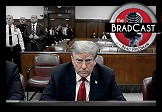READER COMMENTS ON
"If Bush and Cheney Commit War Crimes and Everyone Knows It, But Does Nothing, Are They Still Crimes?"
(34 Responses so far...)
COMMENT #1 [Permalink]
...
Bamboo Harvester
said on 12/18/2008 @ 5:45 pm PT...
COMMENT #2 [Permalink]
...
Bamboo Harvester
said on 12/18/2008 @ 5:54 pm PT...
The American MSM will never regain cred by scrutinizing Mr. Obama it must purge it's Bowels of of the it's g.o.p. (Greedy Obstructionist Pervert's) Pandering Propaganda Pimping !
COMMENT #3 [Permalink]
...
Cyteria
said on 12/18/2008 @ 6:55 pm PT...
I don't remember seeing Bradblog report this, but in October, the War Crimes Commission at the Hague issued six sealed indictments (sealed until he leaves office) against the Bushole himself. Talk was they were about to do the same with Cheney and Rumsfeld. Have I got my facts right? Then Geo Bush better not leave the country.
COMMENT #4 [Permalink]
...
Agent 99
said on 12/18/2008 @ 7:37 pm PT...
Frickin' spam filter is snatching comments again! Sorry, Cyteria.
COMMENT #5 [Permalink]
...
Lora
said on 12/18/2008 @ 10:06 pm PT...
Brad writes,
...accountability for international War Crimes requires an untiring, responsible, focused media to inspire the mobilization of a nation.
I totally agree. I might add that accountability also requires that our so-called elected representatives behave in an untiring, responsible, focused, mobilizing sort of way as well.
Remember what happened when Kucinich read --- for hours -- his articles of impeachment against our so-called leader?
Nada. Zip. Zilch. Zero. That's from the media AND from our so-called elected representatives. It's shameful and intolerable.
Blaming the citizens is reminiscent of blaming the victim. It is not our (the citizens') fault. But, Turley is ultimately right. Even though it is not our fault, the solution will be up to us.
COMMENT #6 [Permalink]
...
g
said on 12/18/2008 @ 10:16 pm PT...
Could someone on TV please ask these simple questions?
1) What should happen to someone who tortures an innocent person? i.e., If the person being tortured turns out to be innocent, what should be the punishment for the person(s) doing the torturing, ordering the torture, and legalizing the torture? (as in most US cases in Iraq, Afghanistan and Gitmo)
2) Torture should NEVER be legalized, because in extreme "ticking time-bomb" cases, the jury can always side with the torturer if they see a genuine necessity for it.
.
Please spread the word on the film that will put BUSH BEHIND BARS!!!
http://thetorturer.com
.
COMMENT #7 [Permalink]
...
Floridiot
said on 12/18/2008 @ 10:22 pm PT...
One thing that's nice about having Olbermann and Maddow, sweet Rach hits the same subject a little more in depth in her reasoning way, she brings this subject to the 'mercan people without being too pushy and turning people off. Link and Link
We have a voice or two now, which is a hell of a lot better than in '03 when the takeover of Iraq started
COMMENT #8 [Permalink]
...
Floridiot
said on 12/18/2008 @ 11:33 pm PT...
Another weird phenomena I have noticed is that the general public doesn't really want to know the whole truth either, they only want what fits into their tiny world view...and somehow that is exactly what the MSM gives them...due to mental conditioning I'd guess.
Just say the words Guantanamo Bay around the unenlightened sometime and watch their expressions...funny
COMMENT #9 [Permalink]
...
jacki penny
said on 12/19/2008 @ 2:03 am PT...
yes floridiot #8, but who owns the media? a few coorperations with their own agenda...
if the msm won't tell the truth then it MUST fall to us. the actions of a few can make a difference, but we are taking on the task of informing the entire herd. sounds tuff, but only recently in our national history have we had the internet & cell phones, etc. our powers of communication are going 2 b our greatest asset & resource available in this & every new national injustice.
(on purpose)the masses are often kept in the dark & then cursed for their blindness (by the powers that b).
"for man is a social animal- only in the herd is he happy. it is all one to him whether it is the profoundest nonsense or the greatest villainy- he feels completely at ease with it, so long as it is the view of the herd, or the action of the herd, & he is able to join the herd." Soren Kierkegaard
COMMENT #10 [Permalink]
...
Phil
said on 12/19/2008 @ 2:08 am PT...
I would argue, that the tools necessary for the public to provide oversight of government are already gone.
The corporate media has clealy left a trail of their stance on uncomfortable topics. (As we have all learned here electronic vote tabulation devices, e.g. election fraud) But their spin, propaganda and blacklists do not end there by far. Yet on the other hand, corporate media does not have tools necessary to hold government accountable either.
What's happened is our representatives no longer represent us.
How many letters have you written, and hours wasted only to the representative's reply come from an automailer? Why should there be any difference between email, snail mail, fax, calling, or face to face? They fully know we want them to cut the crap, yet they continue on despite us. Some of their replys do not even make sense.
They are living in a bubble world. That may eventually work to our advantage, when the Bond Market implodes from ZIRP. If the government has no more money, it's no longer a government.
That's how screwed up I see the situation.
Now we have laws saying if you steal over $5000 it's a felony. (Somewhere on the Bradblog I talked about how OP Scanners cost slightly more, and therefore if you smash three with a hammer three times you could potentially get life in prison--three strike law--By Design? --- Anyway..)
So we have these banks, and people, stealing trillions now. What's up? Why ain't they in jail? Why not take the loss, clear the crap, reset?
Why do we have ACTIVE DUTY Troops doing local law enforcement work?
Why has the US Constitution not been defended by our own military?
ANSWER: We no longer can control our own government. They control us. They can wipe the value of the dollar and make us slaves overnight.
Think... If your dollar is worth Zero then what do you call the work you did for the last 50 years? I'll help you, it's called "slave labor."
I live in California, So I will pose an example. We are not getting our budget passed right now. Because we are literally BANKRUPT! So why did we just have propositions on OUR LAST ballot for trillions of dollars for high-speed trains, schools, roads, infrastructure, law enforcement, healthcare, and my worst worry _LEVIE AND DAM REPAIRS_!
These officials are completely wacked living in a bubble world.
So which Senate Majority are the people supposed to contact? What email address? What fax number? What are we supposed to say in legal speak? We are all too busy now trying to survive to know this. And yeah corporate media is controlled by government as well.
Otherwise there would be no censorship of any word, or investigation.
But back in the 1800's we didn't have TV. Somehow citizens had control of government. On the other hand citizens walked around with guns back then too.
Think about it.
Incrementally over time, more tax, less in return, less rights, and now fear dictates our laws. We have been completely pussy whiped. And now we are about to get but fucked.
You wonder why the government bought a bunch of body bags and fema has built concentration camps?
Now you know.
Your just one spirit reading this and in the big picture your life and my life don't mean a damn thing to what they have planned. After your dead it won't matter. They have a whole generation of fuckups that don't know what the US Constitution was. Don't care. While those in the know use it against us SYMBOLICALLY, saying over and over that we have rights, yet when you get down to it, those rights have been removed.
It's why they can lock up a poll-watcher. It's why they torture, it's why they won't count votes, it's why they stole all our money.
The sooner we get out of fantasy land and come to grips with the reality, the sooner we can take the pain and make this shit go away.
Sadly, it probably won't happen in my lifetime.
Who do you trust anymore?
Your computer tech? Your Banker? Your Senator? Your local Cop? FBI? CIA? NSA? Pentagon?
Give me a fucking break.
COMMENT #11 [Permalink]
...
Phil
said on 12/19/2008 @ 2:17 am PT...
Another barrior is Senators who are from different states not allowing contact from other state's citizens. Especially when the Senator from a different state is about to vote on legislation that will affect / effect the other state. That's fucking bullshit!
COMMENT #12 [Permalink]
...
Phil
said on 12/19/2008 @ 2:23 am PT...
The honest to God truth?
Here is where the problem is.
The military swore an oath to protect the president and the US Constitution.
The President (not as dumb as he looks) has figured out that he can break his OWN OATH to the SAME.
This puts the US Military in a catch 22. They can't stop bush, because they must protect him, they can't protect the US Constitution cause Bush has fucked it up.
Add in the corrupt Senate. And we have destroyed the Constitutional Republic we were given!
Okay? Do you fucking get it?
No more US Constitution. No more LAWS, except to control citizens.
COMMENT #13 [Permalink]
...
jacki penny
said on 12/19/2008 @ 2:37 am PT...
holy cheezits! if i listened 2 u guys i might as well shoot myself & hope there is an after life!
but i'm here now & so i must act according to what my conscience says is right. i will continue 2 try even in the face of utter failure. if only 2 b an example of what may b...
the people who have been most influencial in my life have taught me that perserverance & a mind toward the good is what matters in the end.
quitters never win.
COMMENT #14 [Permalink]
...
jacki penny
said on 12/19/2008 @ 3:15 am PT...
there has been the creation of a steering committee by many high end educators to seek punishment of bushco due to their war crimes. hopefully this link will clue u in to what these people are doing to see that justice is done- even if they have to take their case to The Hague.
http://yubanet.com/opini...-Bush-For-War-Crimes.php
COMMENT #15 [Permalink]
...
Nunyabiz
said on 12/19/2008 @ 4:01 am PT...
The ONLY way these treasonous war criminals are going to see justice is if 10s of millions of angry citizens demand it by putting the proverbial boot heel on the necks of the entire mass media and forces them to tell the truth.
Then involve the global community.
The Media & Congress are obviously not going to do a damn thing because they are both complicit in the crimes.
COMMENT #16 [Permalink]
...
Phil
said on 12/19/2008 @ 4:59 am PT...
Jacki Penny. You think I quit?!
Bzzzzzzzzzzzzzzzzzzzzzzzt....
Wrong.
I just SEE what exists now.
Do you?
COMMENT #17 [Permalink]
...
Soul Rebel
said on 12/19/2008 @ 5:00 am PT...
Bugliosi says it will be up to either a State AG to prosecute for their own citizens' murder, or a Federal AG on behalf of all murdered US soldiers as a result of the illegality of the Iraq conflict and occupation. And it can only be done when Bush leaves office. Which is why I'm so nervous about the next 30 odd days. For years I have contended that this group of thugs, thieves, and miscreants will not go quietly into that dark night - they will, in fact, rage. They ARE raging. If they leave office without the protections it affords, they know they are going down one way or another. There has always been a strong international consciousness about the Bush administration, but how likely is it that there will be any bite to the bark this time?
What's the betting on a "Peaceful Transition of Power?" 50/50 at best, and I'm thinking 2:1 against is reasonable.
That Kierkegaard quote was brilliant.
COMMENT #18 [Permalink]
...
Phil
said on 12/19/2008 @ 5:09 am PT...
Ps: How ya gonna put your boot on the neck of anyone when the cops will back them up? Not you.
Remember they are "Acredited Media" all the rest of you motherfuckers can get screw0red. Too bad my German friends hate me now.. They could cluetrain you in.
As far as Congress. ( I call em Senators ) go. They already said, "FUCK YOU PHIL."
So what say you now?
I felt like smashing $100K Cameras! But it ain't those guy's fault!!! It ain't!!
You wanna protest in front of the fucking TV station? You might just be onto something...
COMMENT #19 [Permalink]
...
Phil
said on 12/19/2008 @ 5:10 am PT...
Not one fucker on this blog has took me up on the offer to run something on my show yet.
So what's up?
COMMENT #20 [Permalink]
...
Phil
said on 12/19/2008 @ 5:17 am PT...
Frank Zappa (Republican) Laughs at you!
I cry about it though. And my health is fucking crap. So what the fuck? Those Bright tooth ass fuckers your friend still or you awaken from your motherfucking daze and see the US Constitution is gone. The only reason they don't prosecute us for speech (First Amendment) is they don't have the FUCKING MONEY!!! HAHAHAHAHAHAHAH!
MY HONEST HOPE is that they loose so much money that they can no longer exist themselves. Problem is SOMEONE does have money / resources / wealth. Are they good or are they evil?
COMMENT #21 [Permalink]
...
molly
said on 12/19/2008 @ 5:46 am PT...
Phil, breathe darling ..we won in the last election. Have a friend with a masters in sociology. Recently , she was going door to door trying to inform her local citizenry about a federal bio terroism lab which was due to locate in there(against the law). She felt because of hercommunit's lack of interest in their own welfare that a big part was schock fatigue. Naomi Klein's book comes to mind.
COMMENT #22 [Permalink]
...
Joan
said on 12/19/2008 @ 5:51 am PT...
How DARE you, Mr. Turley? How DARE you put the blame on citizens?
"this gigantic yawn"?
Obama actually prevailing despite EVERYTHING THEY DID to try & steal THIS election too...that looked like a "yawn" to you?
Oh, but maybe you subscribe to the fiction that our elections being crooked is one of those lame, ludicrous tin-foil-hat conspiracy theories, who knows?
"It is equally immoral to stand silent in the face of a war crime and do nothing, and that is what the citizens are doing"
Have you talked to Congress, Mr. Turley? To prosecutors? People who are actually in positions of power?
Oh but, no. It's OUR fault. We're "SILENT".
How DARE you stand there smug, well fed, securely housed and handsomely paid and tell US---out here in bankruptcy & foreclosure land, with vaporized pensions, with dead-soldier-loved-ones, watching our country raped, robbed & beaten like a sex-trafficking-victim-whore---that WE do not care.
Honest to Christ if you were here in front of me I would slap your face.
COMMENT #23 [Permalink]
...
Matt [A]
said on 12/19/2008 @ 7:09 am PT...
What is the citizenry supposed to do? Millions have complained, blogged, marched, demonstrated, demanded accountability.
Unless he's suggesting citizens do something very radical, which I don't think he is, I'm not entirely sure what "the people" can do aside from voice their displeasure and call for them to be prosecuted? What does he do? If all it takes is a few people to stop them why doesn't he? Isn't he a citizen? You can't blame your citizens when you are one. Tell me what to do to prosecute and I'll do it.
[ed note: We are suffering from a glut of Matts today, both new commenters, so please both of you pick new screen names if you're going to comment again. Thank you. --99]
COMMENT #24 [Permalink]
...
czaragorn
said on 12/19/2008 @ 8:05 am PT...
Right on, Joan and Matt! Mr. Turdley should look in the mirror to find at least one of the true culprits. We've gone to great lengths to try to enlighten our "leaders" - but all in vain, since they're all sold, signed, sealed, and delivered. The gallows and the Guillotine seem immediately appropriate (I'll stand by watching, smoking a Gauloise), but I'm sure this gang of miscreants who have stolen civilization has some "enhanced" methods we could more efficiently apply. I dare those sociopaths to try to get American soldiers to train their weapons on their fellow citizens (true, the bad guys have gutted our education system to ensure an endless supply of ignorant cannon fodder, but ignorance is a natural condition, while stupidity is far rarer, and our soldiers are far from stupid). As some great sage recently commented, "Fool me once, and, yeah, duh, I'm fooled forever," or something of that ilk. I wish I could get into an alumni hockey game with duhbaya. Sure, I'd get 4 minutes for roughing, and five for fighting, and 10-minute and game misconducts, probably, not to mention the high-sticking, cross-checking, slashing, and tripping (prolly what would get me into the scrape in the first place, if you get my drift) for what I'd do to that miserable little cretin, but it would be worth it. He's pretty good at ducking clodhoppers, but I still have a slapshot. (Disclaimer: this is no threat by any means - it's simply a friendly challenge to a friendly little pick-up game of back-yard, Down-Maine, ice hockey. Kennybunkport sounds just about fine.) I seem to have gone off on a tangent. I wish I knew a way out of this one, but in the event that things get even worse, I'll be more than happy to help you all resettle into the ultimately reasonable, truly timeless heart of Europe. (Take that, NSA!)
COMMENT #25 [Permalink]
...
Matt [A]
said on 12/19/2008 @ 9:07 am PT...
I'll add one more note to my comment - I think for me the most interesting legacy of the Bush presidency is the knoweldge that the constituation and laws are more of a gentleman's agreement than anything else. If it sounds like I've given up hope of seeing anyone of signficance prosecuted and punished appropriately I more or less have. The majority of the country holds Bush in low favarobility ratings, most people feel he doesn't represent Democrats, Republicans or most Ameriacans but in the end it doesn't seem to matter much. America is vocal, they voted for the guy who wasn't a Republican. Citizens have the power of the vote and they turned the country and their districts over to the opposing party in hopes of straightening things out. If Mr. Turely feels that voting, blogging, rallys, and expressing themself in everyway they can isn't enough to voice their dissaproval then the only next step is a revolution and lets face it, that can't happen. This isn't a nation of muskets, where the group with more muskets win. This is a nation of slow change and I think the people are on the path in that direction. However if only a handful of people who run for public office for a major party are willing to prosecute the administration for their offenses I'm not sure what else to do? Commenting on citizens apathy is the easy way out. Providing solutions is tough. I'd like to hear someone as obviously bright as Mr. Turley provide solutions and organize. Don't come to me with problems, come to me with solutions.
[ed note: We are suffering from a glut of Matts today, both new commenters, so please both of you pick new screen names if you're going to comment again. Thank you. --99]
COMMENT #26 [Permalink]
...
NewConstituionalConvention
said on 12/19/2008 @ 10:25 am PT...
To the Bastille!
"Liberte, egalite, fraternite!"
"These are revolutionary times. All over the globe men are revolting against old systems of exploitation and oppression, and out of the wounds of a frail world, new systems of justice and equality are being born. The shirtless and barefoot people of the land are rising up as never before. The people who sat in darkness have seen a great light. We in the West must support these revolutions. It is a sad fact that because of comfort, complacency, a morbid fear of communism, and our proneness to adjust to injustice, the Western nations that initiated so much of the revolutionary spirit of the modern world have now become the arch antirevolutionaries...Our only hope today lies in our ability to recapture the revolutionary spirit..."
MLK
The French citizens had it right.
COMMENT #27 [Permalink]
...
Lora
said on 12/19/2008 @ 3:00 pm PT...
Jacki (#9) wrote,
...if the msm won't tell the truth then it MUST fall to us. the actions of a few can make a difference, but we are taking on the task of informing the entire herd.
Think of it as "deprogramming."
COMMENT #28 [Permalink]
...
maninwarren
said on 12/20/2008 @ 8:30 am PT...
Was Cheney behind 9/11 if no one ever investigates it?
COMMENT #29 [Permalink]
...
jacki penny
said on 12/20/2008 @ 10:09 pm PT...
hey Brad, do you ever consider the "comment" #s in mind as to a specific subject? for example, how many comments on election night? or about Sibel Edmonds? can you tell how many people are paying attention by how many comments your blog receives on a particular subject?
how come only 28 comments so far on the greatest political criminals EVER in american his-story? & some of them repeat offenders...
& hey reader, is no one really that interested? or maybe you are all smarter than me- to post on a public forum about my feelings toward prosecuting our current president (according to the nuremberg statute(s). i'm sure you are. but since i've already spilled the beans, string 'em up!
of course, i mean that in the most honorable way... feel free to respond.
COMMENT #30 [Permalink]
...
amanfromMars
said on 12/20/2008 @ 10:49 pm PT...
Does anyone realise or suspect that until and/or unless the chief architects of the abuses of the American Constitution and fundamental Human Rights [and some of their identities have been discussed on this tread, with all of them being a lot dumber than they would have you believe rather than you believing that they are not as dumb as they look (COMMENT #12 ... Phil said on 12/19/2008 @ 2:23 am PT...)] are appropriately publicly prosecuted and given their just desserts ... [with such a precedent and role model having already being set by themselves in prosecution of their nemesis/arch rival, Saddam Hussein].... will the dollar and the economy continue to decline and cause suffering even greater US suffering, as flight from the currency and realignment/reassessment of global strategic and political alliance render its power influence null and void/zero? Which incidentally, is a lot easier to do than you may be able to imagine.
Failure to resolve that conundrum, with so transparently removing that problem from the global stage, will cause the incoming Administration even more problems, for it can be fully expected that they will be battling against the old administration set-ups, which will then be "underground" and working entirely for themselves with no oversight. Just because a Power Structure which has had two terms in Office, is turfed out of Office because of Gross Mismanagement and Feather Nesting, does not mean that their shenanigans will stop, whenever they have been able to do whatever they want and it is so lucrative.
The greatest enemy of Uncle Sam lies within and is invariably in the last Administration and its Offices which abused its Powers and has set up covert operations to feed itself Wealth and Influence. And it is also probably the Real Al Qaeda too ...... hiding in full sight and inventing phantom enemies.
And if that is improbable, then it is probably so, delivering as IT does, an Almost Perfect Stealth.
Methinks Uncle Sam deserves Better, don't you?
COMMENT #31 [Permalink]
...
jacki penny
said on 12/20/2008 @ 11:16 pm PT...
amanfromMars #30
The greatest enemy of Uncle Sam lies within... And it is also probably the Real Al Qaeda too ...... hiding in full sight and inventing phantom enemies.
amanfromMars must b a babe- doesn't it say out of the mouths of babes...?
COMMENT #32 [Permalink]
...
Aelia
said on 12/21/2008 @ 9:17 am PT...
Only one president has fulfilled all requirements for being charged as an international war criminal: Bill Clinton and his surrogates in NATO namely Weasely Clark.
COMMENT #33 [Permalink]
...
FreedomOfInformationAct
said on 12/21/2008 @ 5:43 pm PT...
"If Bush and Cheney Commit War Crimes and Everyone Knows It, But Does Nothing, Are They Still Crimes?"
Yes, Bring on the indictments, trials, convictions and impeachments.
COMMENT #34 [Permalink]
...
nat stone
said on 12/30/2008 @ 1:48 pm PT...
This needs to be dealt with, if for no other reason than to re-establish constitutional principles and prevent this kind of thing from happening again.
No one seems to have the will to move on it though.


 SCOTUS Suddenly Worried About Overcriminalization ... for J6 Insurrectionists: 'BradCast' 4/17/24
SCOTUS Suddenly Worried About Overcriminalization ... for J6 Insurrectionists: 'BradCast' 4/17/24 'Trump Media' Plummeting, MAGA Buyers Losing Life Savings: 'BradCast' 4/16/24
'Trump Media' Plummeting, MAGA Buyers Losing Life Savings: 'BradCast' 4/16/24 'Green News Report' 4/16/24
'Green News Report' 4/16/24
 Trump's First Criminal Trial, for Cheating in 2016, Begins in NY: 'BradCast' 4/15/24
Trump's First Criminal Trial, for Cheating in 2016, Begins in NY: 'BradCast' 4/15/24 Sunday 'Party Like It's 1864' Toons
Sunday 'Party Like It's 1864' Toons Biden Closes 'Gun Show Loophole'; Repubs Turn Desperate: 'BradCast' 4/11/24
Biden Closes 'Gun Show Loophole'; Repubs Turn Desperate: 'BradCast' 4/11/24  'Green News Report' 4/11/24
'Green News Report' 4/11/24 'Pink Slime': Fake 'Local News' Sites Proliferating in Advance of Election: 'BradCast' 4/10/24
'Pink Slime': Fake 'Local News' Sites Proliferating in Advance of Election: 'BradCast' 4/10/24 Dirty Tricks and the Dirtiest Candidate Of All Time: 'BradCast' 4/9/24
Dirty Tricks and the Dirtiest Candidate Of All Time: 'BradCast' 4/9/24 'Green News Report' 4/9/24
'Green News Report' 4/9/24 'Titanic Law' Reform Just Tip of Iceberg in Quest for Key Bridge Accountability: 'BradCast' 4/8/24
'Titanic Law' Reform Just Tip of Iceberg in Quest for Key Bridge Accountability: 'BradCast' 4/8/24 Sunday 'Dark Days Indeed' Toons
Sunday 'Dark Days Indeed' Toons Trump's Very Bad Day in Court(s), Other Good (& Less Good) News: 'BradCast' 4/4
Trump's Very Bad Day in Court(s), Other Good (& Less Good) News: 'BradCast' 4/4 'Green News Report' 4/4/24
'Green News Report' 4/4/24 WI Supremes May Restore Drop-Box Voting
WI Supremes May Restore Drop-Box Voting WI Voters Approve Election Crippling Ballot Measures: 'BradCast' 4/3/24
WI Voters Approve Election Crippling Ballot Measures: 'BradCast' 4/3/24  Politico's Josh Gerstein Owes a Retraction
Politico's Josh Gerstein Owes a Retraction More GOP Election Fraud; Overdue Justice for Crystal Mason: 'BradCast' 4/2/24
More GOP Election Fraud; Overdue Justice for Crystal Mason: 'BradCast' 4/2/24 Last Week Today with OG Bloggers:
Last Week Today with OG Bloggers: It's Up to You, New York: 'BradCast' 3/21/24
It's Up to You, New York: 'BradCast' 3/21/24 'It All Comes Down to Brett and Amy': 'BradCast' 3/20/24
'It All Comes Down to Brett and Amy': 'BradCast' 3/20/24 American 'Bloodbath': 'BradCast' 3/19/24
American 'Bloodbath': 'BradCast' 3/19/24
 VA GOP VOTER REG FRAUDSTER OFF HOOK
VA GOP VOTER REG FRAUDSTER OFF HOOK Criminal GOP Voter Registration Fraud Probe Expanding in VA
Criminal GOP Voter Registration Fraud Probe Expanding in VA DOJ PROBE SOUGHT AFTER VA ARREST
DOJ PROBE SOUGHT AFTER VA ARREST Arrest in VA: GOP Voter Reg Scandal Widens
Arrest in VA: GOP Voter Reg Scandal Widens ALL TOGETHER: ROVE, SPROUL, KOCHS, RNC
ALL TOGETHER: ROVE, SPROUL, KOCHS, RNC LATimes: RNC's 'Fired' Sproul Working for Repubs in 'as Many as 30 States'
LATimes: RNC's 'Fired' Sproul Working for Repubs in 'as Many as 30 States' 'Fired' Sproul Group 'Cloned', Still Working for Republicans in At Least 10 States
'Fired' Sproul Group 'Cloned', Still Working for Republicans in At Least 10 States FINALLY: FOX ON GOP REG FRAUD SCANDAL
FINALLY: FOX ON GOP REG FRAUD SCANDAL COLORADO FOLLOWS FLORIDA WITH GOP CRIMINAL INVESTIGATION
COLORADO FOLLOWS FLORIDA WITH GOP CRIMINAL INVESTIGATION CRIMINAL PROBE LAUNCHED INTO GOP VOTER REGISTRATION FRAUD SCANDAL IN FL
CRIMINAL PROBE LAUNCHED INTO GOP VOTER REGISTRATION FRAUD SCANDAL IN FL Brad Breaks PA Photo ID & GOP Registration Fraud Scandal News on Hartmann TV
Brad Breaks PA Photo ID & GOP Registration Fraud Scandal News on Hartmann TV  CAUGHT ON TAPE: COORDINATED NATIONWIDE GOP VOTER REG SCAM
CAUGHT ON TAPE: COORDINATED NATIONWIDE GOP VOTER REG SCAM CRIMINAL ELECTION FRAUD COMPLAINT FILED AGAINST GOP 'FRAUD' FIRM
CRIMINAL ELECTION FRAUD COMPLAINT FILED AGAINST GOP 'FRAUD' FIRM RICK SCOTT GETS ROLLED IN GOP REGISTRATION FRAUD SCANDAL
RICK SCOTT GETS ROLLED IN GOP REGISTRATION FRAUD SCANDAL VIDEO: Brad Breaks GOP Reg Fraud Scandal on Hartmann TV
VIDEO: Brad Breaks GOP Reg Fraud Scandal on Hartmann TV RNC FIRES NATIONAL VOTER REGISTRATION FIRM FOR FRAUD
RNC FIRES NATIONAL VOTER REGISTRATION FIRM FOR FRAUD EXCLUSIVE: Intvw w/ FL Official Who First Discovered GOP Reg Fraud
EXCLUSIVE: Intvw w/ FL Official Who First Discovered GOP Reg Fraud GOP REGISTRATION FRAUD FOUND IN FL
GOP REGISTRATION FRAUD FOUND IN FL


































